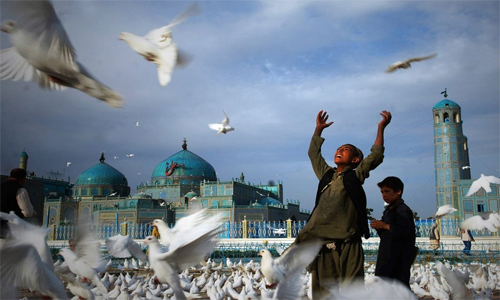Following the trip of a Taliban delegation to Islamabad, the issue of peace talks resumption has resurfaced. The Afghan government has reiterated Afghan-owned and Afghan-led talks and regional stakeholders have stressed their inclusion in the process.
The Taliban delegation have reportedly met with Pakistani Prime Minister Imran Khan and US Special Representative for Afghanistan Reconciliation Zalmay Khalilzad in Islamabad, however, the content of the discussion is not clear.
Showing reaction to the issue, Afghan Deputy Minister of Foreign Affairs Indrees Zaman said Afghanistan was not supporting any talks held without presence of the Afghan government. He added that Taliban delegation paid a visit to Pakistan to ask the country for cooperation in resuming peace talks with the United States. He stated that all routes to the peace were passing from Kabul.
Meanwhile, the Indian government said there was a need for involvement of all stakeholders, including the Kabul government, in the Afghan peace process.
Furthermore, Iranian Foreign Minister Mohammad Javad Zarif is cited as saying, “We support peace talks in Afghanistan with all sides” adding that “Afghans should be involved in the peace process”.
Considering the above statements, both Kabul government and regional stakeholders urge for an inclusive peace talks with the involvement of all sides. Regional powers fear that the issue of Afghan peace process will be capitalized on by their rival states. They are also concerned about the post-peace deal strategy. For example, India is worried if Afghan soil is used against it after the peace agreement.
“Apparently, the Taliban have not yet worked out a post-peace deal strategy in terms of how they will transform their war machinery into a political asset. So far, they have been set on capitalizing on foreign troops’ withdrawal and devising a power-sharing formula with other stakeholders in Afghanistan,” said a Pakistani military analyst.
Imran Khan is said to visit China soon. In addition to CPEC, he will discuss Afghan peace process with the Chinese leadership. Both will encourage the Taliban to go with the peace process in Afghanistan.
Chinese leadership has worked to bring Kabul and Islamabad closer. The third China-Afghanistan-Pakistan Foreign Minister Dialogue was held in Islamabad on 7 September. The foreign ministers of the three countries reaffirmed their determination to cement trilateral trust and support reconciliation, regional peace and stability, and counter-terrorism.
China would prefer to use the regional platform, preferably the Shanghai Cooperation Organization, to drive negotiations. Moreover, Chinese officials have also reiterated on several occasions that China supported peace talks under the leadership and ownership of the Kabul administration.
As regional states have signaled their support for Afghan-owned negotiations and Russia plans to organize a meeting with the Taliban on Afghan peace process, they have to push the Taliban to sit around negotiating table with the Kabul government. It is believed that marginalization of Kabul in the talks will be proved detrimental and vice versa. Moscow, Tehran, and Islamabad have to use their leverage to broker talks between the Afghan government and Taliban leadership.
It is not certain whether the US and Taliban will resume from the point at which the talks fell apart or if both sides will renegotiate specific terms. The Taliban are likely to insist on the agreed draft, which was acceptable neither to the Trump administration nor to the Kabul government. Pakistan is expected to urge the Taliban to renegotiate.
Pakistan’s Khan offered to get involved with the political solution for peace in Afghanistan after the US-Taliban talks broke down in early September. Urging that military deal would be proved abortive, Khan said that “there needs to be some sort of a peace deal. There has to be a political settlement”.
He added that within more than a year that he had been prime minister, he had sought peace with Afghanistan.
Afghan officials also believe that the role of regional states is crucial in the peace process and they have to put all their weight behind the talks with sincere intention and support intra-Afghan dialogue. Hosting Taliban delegation without consulting with the Afghan administration and having backdoor discussion with it will not be approved by Kabul. Although much has been said about the process and the Taliban delegation were hosted several times by regional states, no positive outcome has emerged. In short, Kabul wants the states, which host the Taliban representatives, to show the positive result of their meetings.
This will be a crucial time for various stakeholders to enable a roadmap for peace, along with the Kabul administration, to end the 18-year conflict and pressure the Taliban to declare ceasefire as a gesture of goodwill.
Home » Opinion » Regional Stakeholders Urge for Inclusive Peace Talks
Regional Stakeholders Urge for Inclusive Peace Talks
| Hujjatullah Zia

